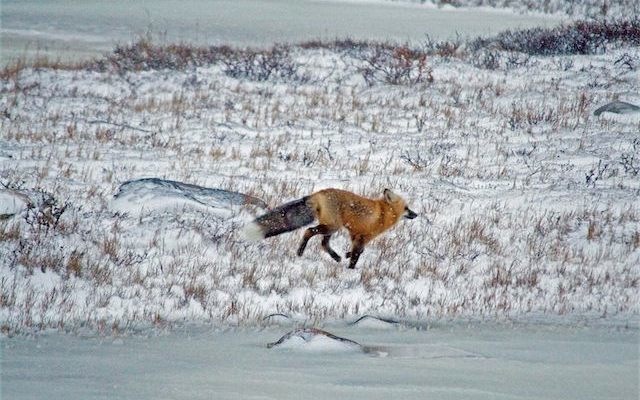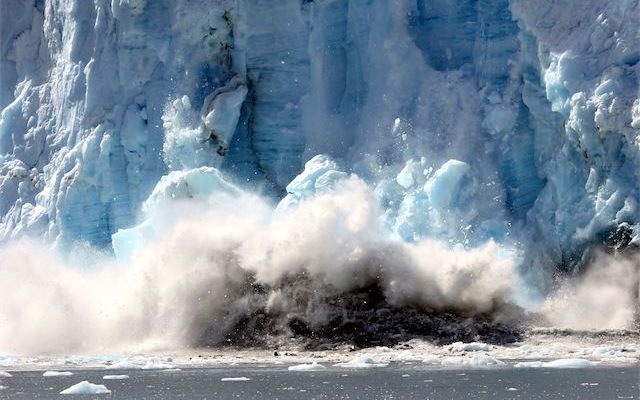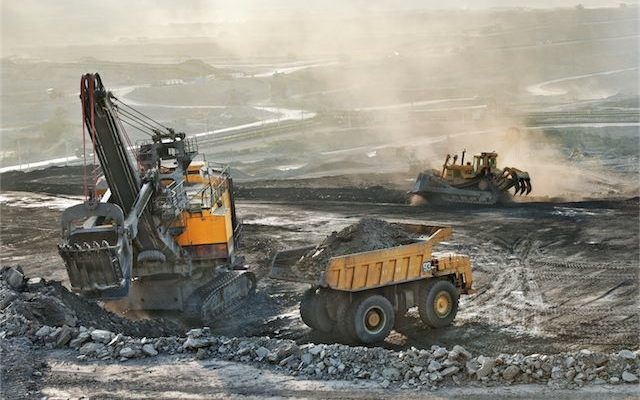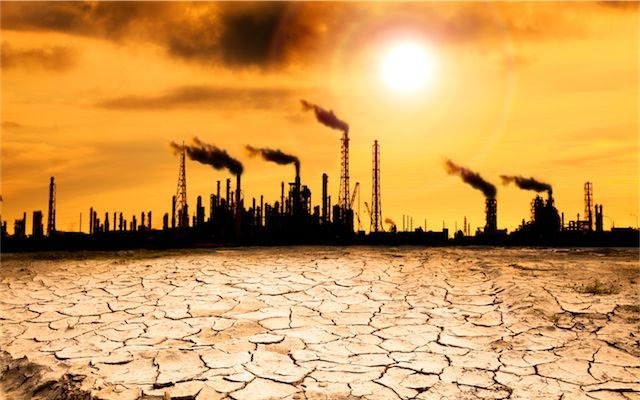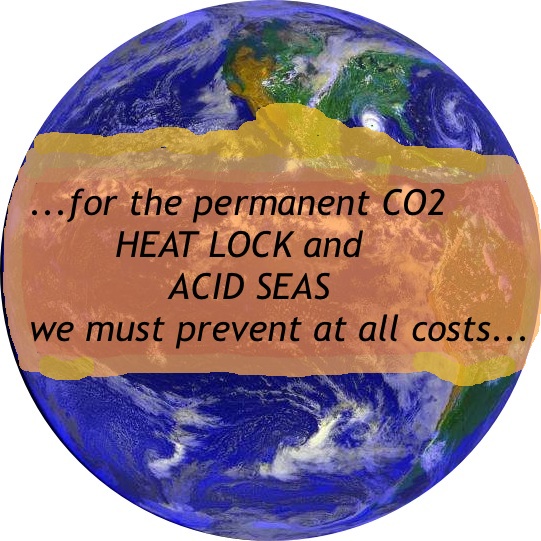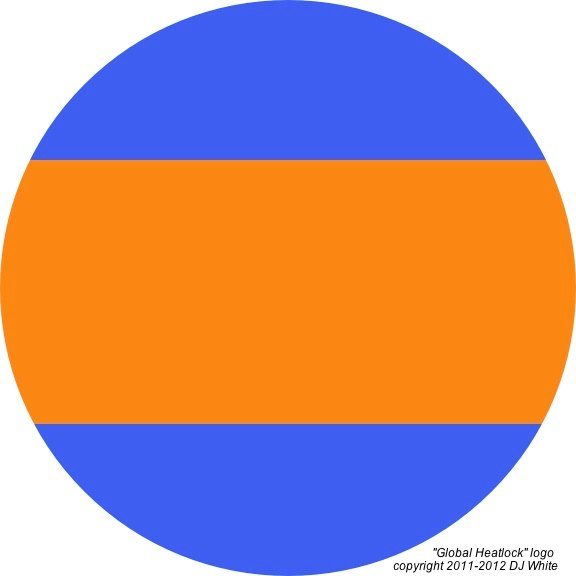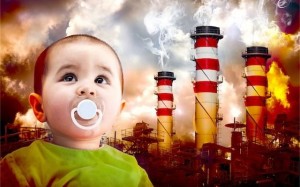The ET Carbon Campaign – CO2 400
The existence of easily-accessible fossil carbon was a trap laid down by geology before we evolved. We have taken the bait, and are now well on our way to acidifying the seas and locking in a terrible heat for hundreds of thousands of years.
The Ultimate Crisis: The Loss of a World
The earth itself is in no trouble, if by “the earth” you refer to an inert ball of heavy elements revolving around the sun. That will continue for quite some time.
And “life” is in no trouble, if by “life” you mean jellyfish, cockroaches, bacterial slimes and algae.
However, by any useful definition relevant to continued human existence, earth life is in big trouble.
Having stumbled upon a geological “monkey trap” of accessible fossil carbon, we have burned over a trillion tons of the stuff, and the amount we burn continues to increase year over year.
CO2 is now at 400 parts per million in the atmosphere. There have never before been humans born into such an atmosphere, and we’re sailing rapidly past that mark on the way to 1000ppm and higher.
That level of CO2 is not compatible with the sea life we evolved with. The inevitable acidification will dissolve the coral, the calcium skeletons, the shells, and knock gaping holes in the food chains. Goodbye fish, seals, dolphins and whales; hello slime. For perhaps a million years or more. Evolution will keep working, but it works slowly, and will be starting over from what’s left.
We have already emitted enough CO2 to prevent another ice age in 50,000 years. The CO2 we’re emitting will last hundreds of thousands of years before returning to the levels we evolved under. Only during the tiny beginning edge of that period will we have air conditioners, cars, planes and plenty of food. Those will be largely gone within 100 years. What will be left will simply be a sort of hell. There’s utterly no guarantee we’ll come out the other side of it. Most of the other large animal species won’t.
Many people talk about adaptation to the “new normal”. And the poor souls who come after us will certainly have to, or die. But this isn’t the time for adaptation, it’s the time for bravery and strong personal stands. A patriotism of the deepest kind, for a world.
We’ll be trying to figure ways’ forward. If you join our campaign, that’s what you’ll be joining.
The Accommodation of Evil
There’s a term that’s out of fashion in the secular world. Evil.
It needs to be used in relation to continued fossil carbon burning, now that we know what we’re doing.
There are words that have been associated with “evil”. Genocide. Child Abuse. Rape. Arson. Slavery. Turning a blind eye to fossil carbon burning is all of that, and more, for it stands to preclude the bulk of human lives that would otherwise be lived on this planet; and will render the lives remaining much more desperate.
We have always had a hard time really caring for the weak and vulnerable. And there are none so weak and vulnerable as the hundreds of billions of human children who could be born to happy, full lives in the coming eons. Yet their existence is downstream of our whims and decisions.
The idea of human children being alive on earth in a million years seems like science fiction. Yet the only – ONLY – reason this is in doubt is our mad rush to burn the fossil carbon that nature sequestered away from the biosphere for hundreds of millions of years. We use circular reasoning: those future lives aren’t real to us because they might never be lived. Since they might never be lived, they might as well never be lived.
So we keep on burning. The oceans turn to slime, the rainforests and farmland to desert. But not for a little while. In the meantime, we continue our orgy.
Let’s be honest, it isn’t oil companies, coal companies, gas companies. They’re supplying something we demand. We all need to own up to our complicity in the greatest crime there ever was or could be. And perhaps take a difficult stand.
Against Evil.
Fossil Carbon, not “fossil fuels”.
You won’t see us using the term “fossil fuels” and we’d like to ask that you don’t either.
The way we think about things and refer to them is important.
The correct term for coal, oil and gas is fossil hydrocarbons, or just fossil carbon. It’s called “fossil” since it came from living plants which took the CO2 out of the air during hellish climates hundreds of millions of years ago.
If all that buried fossil carbon is “fuel”, we have lost a world. There is an implied assumption that “fuel” exists to be burned. Just like whalers refer to whale populations as “stocks” to end the basic argument before it begins.
Our world has a lot of fossil carbon, the result of gradual processes making the world more fit for our kind of life in the dim past. But let’s watch our terminology. Doesn’t seem like a big deal, but it is. Because most of that fossil carbon is toted up on corporate balance sheets as if it were destined to be fuel.
And that can’t be allowed to happen.
Can you say “LIITG”?
We’d better learn.
It’s not a Norse god or an obscure scientific term; it’s a straightforward acronym for a sentence we all need to start saying a lot.
LEAVE IT IN THE GROUND.
Because the long and short of it is that if we don’t leave most remaining fossil carbon in the ground, most of the ecosystem we have evolved in, the animals and plants which have supported us, the seas full of food… are toast.
There are hard limits we are pushing the biosphere beyond. The oceans can only get a bit more acid before it’s impossible for calcium carbonate to be condensed for coral reefs, calcium skeletons, calcium shells. Life adapts, but it can’t adapt to that any more than we could adapt to not having skeletons. And the increase in acidity is happening at least ten times as fast as ever before in world history. Your grandchildren will only know living coral reefs from old video footage.
The types of sea species which can survive ultra-rapid change aren’t the ones that we like, identify with, and depend on. If we keep on burning fossil carbon for another few decades, we can say goodbye to seas of fish, squid, and sea mammals and hello to jellyfish, salps, algal mats and bacterial slimes.
The great rainforests will vanish, along with most of the world’s specialized species. There will simply be nowhere for them to go.
And then it will REALLY start to get depressing.
But it hasn’t happened yet. It doesn’t have to. It’s unacceptable.
I know that may sound naive, but I’ve had 40 years of experience engaging with environmental problems. Nothing on this scale – there as never been ANYthing else on this scale – we’re dealing with the metabolic basis of corporate industrialism and human society. But in principle, there is no reason to assume the world is pre-doomed to the particular hells that science is now showing us.
In the ’70’s I worked as a geophysicist for an oil-exploration firm, before just walking away from it in the middle of a work day to instead spend my life working for the planet. It meant leaving behind a big paycheck and a secure personal future to work harder and live a relatively austere existence. And though I imagined it would be a sacrifice, it wasn’t at all. It turned out I didn’t need most of what I thought I needed.
Human happiness and fulfillment – living a good life – doesn’t depend on the wild extravagances we tend to think we need. Do we really need generators running full-speed all night in case we want to spontaneously bake a turkey at 3am? Do we need electric clothes dryers when the sun is shining? Do we need to stimulate our brains with the latest toys and possessions? It turns out we don’t. Once you cover the basic needs, money and energy don’t add to human happiness. Yet the accelerated burning of fossil carbon sure as hell will do a number on the happiness – even survival – of all future generations.
As it turns out, being a geologist was a good grounding in environmental thinking, because I had to learn to think in terms of hundreds of millions of years, to learn to read the ebb and flow, the flourishing and disasters of past earth life written in the rocks. It’s a perspective I recommend: deep time. We are, each of us, the living continuation of something immensely old, the quickening of life 3.5 billion years ago. The earth’s sun is getting older and our world will eventually heat and die, but we might have another half-billion years if we don’t throw it away.
Large multi-cellular life like us is the most fragile sort. We have the illusion that we can adapt, but that’s part of the carbon trance. Most of what we do is done by burning carbon, and that will be very temporary even if we burn it all. The great carbon surge will be over in a century either way. It’s a one-off event, like ants finding a bag of sugar. And in payment for that extra century of declining power, we consign the planet to a kind of hell for hundreds of thousands of years.
We claim to care about our kids and grandkids. That’s not looking very credible.
Unless we liitg. Leave it in the ground. In the end, that’s what we simply must do. Leave it in the ground. No more, no less.
– DJ White, ET founder




